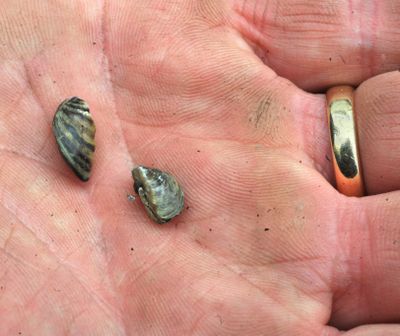Harmful bivalve removed from boat
Zebra mussel-clad vessel was passing through state

BELLINGHAM – A tiny mussel with a voracious appetite was spotted before it could potentially cause major headaches in Washington state.
Bob Allred of S&K Yacht Services was transporting a 57-foot boat by truck from Michigan to British Columbia when state officials in Cle Elum discovered zebra mussels were attached to the boat. The boat was quarantined and taken to the Seaview North Boatyard in Bellingham’s Squalicum Harbor earlier this week to be cleaned before continuing on to Canada.
The boat was pulled off the Great Lakes waters in Detroit. Knowing zebra mussels, considered an invasive species, inhabit those waters, Allred said they inspected the boat before loading it onto the truck. The boat passed an inspection by Washington officials in Plymouth (near the Oregon border) before being inspected again at Cle Elum.
Upon closer inspection, officials found the mussels behind a light fixture on the stern. Allred, who is only the boat hauler, the boat’s owner and Seaview North worked cooperatively with state officials to make sure it didn’t contaminate Washington waters, according to the state Recreation and Conservation office.
“I was quite surprised when the mussels were found, but it’s great the inspection system worked well,” Allred said. “They (zebra mussels) are real small but very prolific. They will eat so much underwater vegetation that it becomes a big problem for other aquatic life.”
Phil Riise, owner of the four Seaview boatyards in Washington, said he’s been aware for about 10 years of the problem these mussels can cause. All the boatyards in this state have been asked to keep an eye out for them.
“These things will kill everything in the water and take over an entire area,” Riise said. “The first thing we do if we spot them is call the DOE (Department of Ecology).”
The Department of Fish and Wildlife, along with Washington State Patrol officers, have been checking boats being hauled into the state since 2006 and have found quagga and zebra mussels on more than 20 boats. These mussels have been such a problem in the Great Lakes area that up to $500 million is being spent annually in that region to control them. Besides endangering native plants and animals, the mussels can clog water-intake systems at power plants and other water facilities.
“We had a close call this week,” said Chris Christopher, chair of the Washington Invasive Species Council, in a press release. “Thanks to the skill of our state enforcement officers and the quick response by the Washington state Department of Fish and Wildlife, we still can say Washington waters are free of zebra mussel, and we can avoid spending millions of dollars to remove them.”